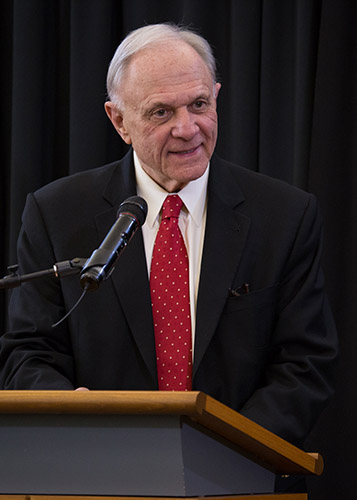FAYETTEVILLE, Ark. – Former U.S. Sen. David Pryor will discuss his experiences in Congress during a time when members were better able to work together and explain what has happened in recent decades that led to a dysfunctional system.
The Osher Lifelong Learning Institute at the University of Arkansas presents an evening with Pryor from 6 to 8 p.m. May 27 at the University of Arkansas Global Campus facility at 2 E. Center St. in Fayetteville. It is free and open to the public.
“I look forward to speaking with members of the Osher Lifelong Learning Institute and others in the public who are curious about the inner workings of Congress,” Pryor said. “I expect to have a dialogue with this group that will be enlightening and enjoyable for us all.”
The evening will offer ample opportunity for people to ask questions. Steve Clark, president and CEO of the Fayetteville Chamber of Commerce, will serve as moderator for the evening.
“This will be a wonderful opportunity for people to have a conversation with Sen. Pryor as he draws upon his vast experience in government,” said Hugh Earnest, chair of the Osher Lifelong Learning Institute curriculum committee. “OLLI is proud to present this event to the public, as well as our members who thoroughly enjoy the chance to continue learning about a wide variety of topics.”
The free event is the last part of a three-part class offered by the Osher Lifelong Learning Institute on the “Dysfunctional World of Congress.”
Pryor served as governor of Arkansas from 1975 to 1979 and currently is a member of the board of trustees of the University of Arkansas. He served in the U.S. House of Representatives from 1966 to 1973 and in the U.S. Senate from 1979 to 1997.
Pryor and his wife, Barbara, were instrumental in the establishment in 1999 of the David and Barbara Pryor Center for Arkansas Oral and Visual History at the University of Arkansas. The center’s mission is to document the cultural heritage of Arkansans by collecting oral and moving image resources and to share those resources with scholars, students and the public.
Brinck Kerr, a U of A professor of political science, and Karen Sebold, a U of A political science instructor, taught the first two class sessions. They focused on the complex, sometimes-strained relationship between the executive, legislative and judicial branches. Sebold covered how Congress works in developing, discussing and debating a bill, coupled with the role of lobbyists in the process. Kerr addressed the recent slide into gridlock and the reasons behind this near paralysis.
The Osher Lifelong Learning Institute based in the College of Education and Health Professions offered more than 80 non-credit classes this spring for members aged 50 and older.
Topics
Contacts
Heidi Wells, content writer and strategist
Global Campus
479-879-8760,
